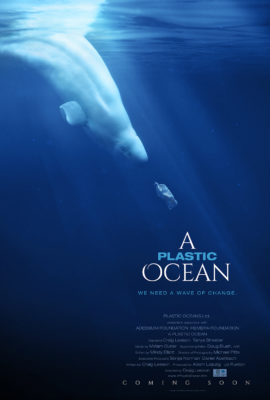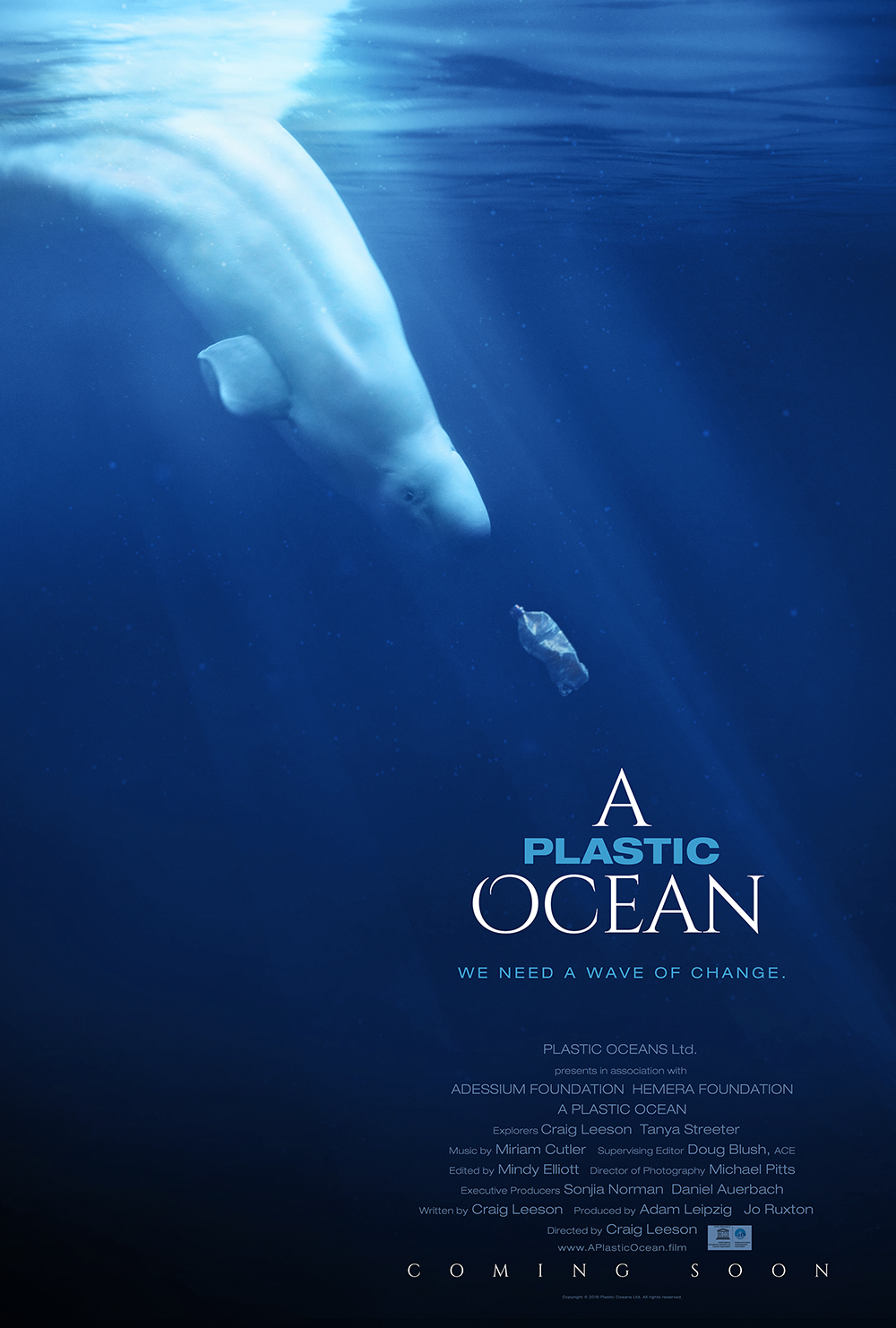“A Plastic Ocean” is not the film its director, writer, and executive producer Craig Leeson started out making.
Off the coast of Sri Lanka in the Indian Ocean in 2011, journalist and filmmaker Leeson was on a boat with a cameraman and crew trying to get footage for a documentary on the blue whale. While they got some blue whale footage, including what is believed to be the first underwater footage of a juvenile pygmy blue whale, they were also surprised to catch on film a stream of garbage and debris.

Release Year: 2016
Director: Craig Leeson
Running time: 1h 42min
Watch trailer
Underwater cameraman Doug Allen describes it fairly well at first: “Floating on the surface and a meter below was just this horrible, crappy, emulsified mess of oil and bits of, you know…”
He trails off, struggling to find the words to capture the assortment of items they fished out of the water (collecting them in a plastic shopping basket one should only find in a grocery or drug store, not the middle of the ocean).
Approximately eight million tons of plastic is dumped in our oceans every year, with most of it coming not from boats and ocean vessels, but from land-based sources then making it’s way to the sea from rivers and streams.
Plastic wreaks havoc on the ocean environment and the plants, animals, and fish that live in and around. Whales, which feed by opening their large jaws and taking in large amounts of water, along with whatever is in it, then expel the water, end up with stomachs full of plastic instead of krill.
Microplastics, or the tiny little pellets of plastic that larger plastic debris often crumbles into, are ingested by fish, and the toxic chemicals that ride on the plastic end up in the tissue of the fish, which larger animals (including humans) then eat.
In an area of the North Pacific Ocean with no visible garbage on the surface of the water, Dr. Andrea Neal puts a trawl with a very fine net that catches anything larger than a pinhead into the water. A handful of microplastics comes up in the net.
Dr. Neal says this “plastic smog” is more insidious than the infamous large floating island of plastics and other garbage.
It is not just marine species that are endangered by plastic in the ocean. Seabirds like the albatross and shearwater are also struggling because of it.
Many birds die because they inadvertently eat small pieces of plastic or microplastics when they feed on fish from the ocean. Eventually their stomachs are totally full of plastic, as we see when a couple of birds are cut open.
You can see their stomachs are large and hard before the stomach itself is cut, revealing nothing but a variety of plastic. It is estimated that ninety percent of all seabirds have ingested some plastic.
While some people are working on ways to remove plastic that is already in the ocean, the bigger and perhaps more important task is stopping the massive flow of plastic that is currently going into the ocean.
Plastic is nearly everywhere in modern society. Plastic is so versatile that it has thousands of uses. The problem is that it never totally degrades.
Says Leeson: “Plastic is wonderful because it is durable. And plastic is terrible because it is durable.”
World-record free diver Tanya Streeter notes in a TEDx talk we see a clip of in the film, that lots of plastic items are considered “disposable,” and asks “how can a disposable product be made of a material that is indestructible? Where does it go?”
She also notes that more plastic has been made in the last ten years than in the century before that. We use massive amounts of plastic, and are not reusing or recycling nearly enough of it.
In one year, every person on the planet will use about three-hundred pounds of single use plastic. Just in the United States, over thirty-eight billion plastic water bottles will be thrown away in one year. It takes over sixty-three billion gallons of oil to make all the plastic water bottles used in the US every year, and over ninety percent of those bottles are only used once.
While the amount of plastic produced each year is already massive, production is expected to triple by 2050 as the world population increases.
We need to start taking action to address this problem now.
First of all, we can try to use less plastic to begin with.
One of the big culprits is plastic packaging on food. Ask your grocer and restaurants you frequent not to package food in plastic.
If you have to buy food in plastic, buy it in larger quantities. With yogurt, for example, you should buy the large container rather than the individual servings. When getting produce at the grocery store, avoid using the plastic produce bags except for smaller items, or rinse and re-use bags for multiple grocery trips.
At home, use aluminum foil (and then recycle it!) instead of plastic wrap or plastic bags. Wash and reuse plastic bags for items that you can’t put in foil, or use reusable containers instead of bags and foil. Use glass food containers instead of plastic whenever possible. Reducing the plastics we use to store and serve food is important not just for the environment, but also our health, since we often ingest toxic chemicals such as BPA when we eat and drink from plastic containers.
Many people already take reusable cloth bags to carry their groceries in, and this is great. Why not also use those reusable bags when you do other shopping, like at the mall, department stores, drug stores, etc.? Use the big pile of plastic shopping bags you’ve already gotten from your shopping as garbage bags instead of buying plastic garbage bags, or recycle them; most grocery stores have a collection bin.
The City of Seattle’s plastic bag ban went into effect in 2012, and an increasing number of cities around the country are following suit with their own bans.
Rawanda has a country-wide ban on plastic bags, and in “A Plastic Ocean”, we see workers making paper bags. Push your city, county, and state to ban plastic bags, plastic water bottles, and plastic straws and utensils at restaurants.
Along with using less plastic, we should recycle what we do use. It is said in the film that the technology now exists to recycle most plastics, so the issue now is getting the infrastructure, systems, and collection methods to do it on a large scale. For example, there is a company in Ireland that created a process to turn “end of life” plastics like candy bar wrappers and plastic bags into diesel.
In Germany, a 1991 law makes manufacturers responsible for the recycling or disposal of any packaging material they sell.
This has led to extensive recycling programs, including vending-machine-type devices at almost every grocery store where consumers can deposit plastic bottles and get a few cents back for each one. Everyone recycles because they get money back for doing so, and recycling is a lucrative industry.
We ought to develop a similar law in the United States.
Some people are lobbying to classify plastic as hazardous, and then existing laws about disposal of hazardous material would then cover plastics.
The film also highlights and interesting social enterprise called The Plastic Bank. In Haiti, people can turn in recyclable plastic and get money or necessary goods in exchange. The plastic is recycled and then sold to be used in manufacturing.
Near the end of “A Plastic Ocean”, Leeson offers this thought: “Every species on the planet works towards the benefit of the ecology and environment that it lives in, but us humans, we just seem like passengers on this earth.”
This observation really struck a chord with me. It is amazing how every species serves a unique and necessary biological function on this planet. Except humans, as far as I can tell. We just seem to endlessly consume and destroy. Or is our function to destroy the planet, until most current species die off and an entirely new world is created from the drastically altered environments we’ve left behind?
I honestly don’t believe that is our purpose (nor do I want to go any further down that existential black hole) so let’s all just agree to try to preserve the planet we’ve got, since it really is an amazing and beautiful place. If we stop covering it in plastic.
If you have more ideas for reducing plastic usage in everyday life, whether through using materials other than plastic or reusing plastic items as much as possible, please leave a comment in the thread below.
You can stream “A Plastic Ocean” on Netflix, or rent or buy it on YouTube, Google Play, or iTunes. You can also request to host a screening, check out the schedule of screenings, or rent or buy the film directly from Plastic Oceans Foundation.

